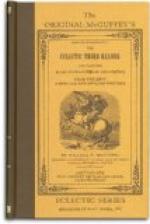In 1837 Professor Calvin E. Stowe went to Europe to investigate the organization and method of elementary schools. On his return he published, in 1838, his report on the Prussian system. Subsequently Dr. McGuffey labored in Ohio with Samuel Lewis and other public-spirited men for the passage of the general school law under which the common schools of Ohio were first organized. He carried to Virginia the same zeal for the education of all the children of the state to prepare them for the duties of life. One of his first acts on assuming the duties of his professorship in the university was to make a tour of the state advocating the introduction of a public school system in Virginia. To this first appeal for common schools, open alike to rich and poor, there was then but a feeble response; but, twenty-five years later, Dr. McGuffey had the satisfaction of seeing the public schools organized with one of his own friends and a former pupil at its head,—Hon. W.H. Ruffner.
Dr. McGuffey was a man of medium stature and compact figure. His forehead was broad and full; his eyes clear and expressive. His features were of the strongly marked rugged Scotch type. He was a ready speaker, a popular lecturer on educational topics, and an able preacher. He was admirable in conversation. His observation of men was accurate, and his study of character close.
[Trip Through the South]
After the Civil War and while the reconstruction was in progress it was extremely difficult in the North to obtain a correct view of the situation in the South. State governments had been established in which “carpet-baggers” had more or less control. Nearly all the whites in the South had taken part in the war. They were largely disfranchised and their former servants often became the legal rulers. The Klu Klux Klan had begun their unlawful work, of which the papers gave contradictory reports.
As business men, the publishers of McGuffey’s Readers desired to learn the truth about the situation of the South and its probable future. They asked Dr. McGuffey to take a trip through the Carolinas, Georgia, Alabama, and Mississippi and make report to them at Cincinnati. This he did, visiting all the larger towns where he was usually the honored guest of some graduate of the university. He saw the legislatures in session, met the governors, and studied the whole situation. He then came to Cincinnati and told his story. He had made no notes, but he never hesitated for a name. He repeated conversations with unquestioned accuracy and described with humor the gross ignorance and brutality of some of the southern legislators, the looting of the capitol at the end of the session, the indirect robbery that was under way, the reversal of all the conditions of life, and the growing unrest of the men who had heretofore been the rulers.
It was such a picture as at that time no Northern paper would have dared to print—it was the truth. For days he held his listeners captive with the story—the writer never heard a more interesting one.




